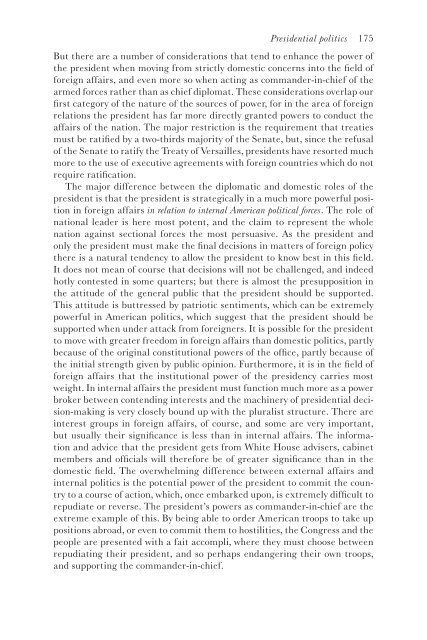POLITICS AND GOVERNMENT Politics in the USA
You also want an ePaper? Increase the reach of your titles
YUMPU automatically turns print PDFs into web optimized ePapers that Google loves.
Presidential politics 175<br />
But <strong>the</strong>re are a number of considerations that tend to enhance <strong>the</strong> power of<br />
<strong>the</strong> president when mov<strong>in</strong>g from strictly domestic concerns <strong>in</strong>to <strong>the</strong> field of<br />
foreign affairs, and even more so when act<strong>in</strong>g as commander-<strong>in</strong>-chief of <strong>the</strong><br />
armed forces ra<strong>the</strong>r than as chief diplomat. These considerations overlap our<br />
first category of <strong>the</strong> nature of <strong>the</strong> sources of power, for <strong>in</strong> <strong>the</strong> area of foreign<br />
relations <strong>the</strong> president has far more directly granted powers to conduct <strong>the</strong><br />
affairs of <strong>the</strong> nation. The major restriction is <strong>the</strong> requirement that treaties<br />
must be ratified by a two-thirds majority of <strong>the</strong> Senate, but, s<strong>in</strong>ce <strong>the</strong> refusal<br />
of <strong>the</strong> Senate to ratify <strong>the</strong> Treaty of Versailles, presidents have resorted much<br />
more to <strong>the</strong> use of executive agreements with foreign countries which do not<br />
require ratification.<br />
The major difference between <strong>the</strong> diplomatic and domestic roles of <strong>the</strong><br />
president is that <strong>the</strong> president is strategically <strong>in</strong> a much more powerful position<br />
<strong>in</strong> foreign affairs <strong>in</strong> relation to <strong>in</strong>ternal American political forces. The role of<br />
national leader is here most potent, and <strong>the</strong> claim to represent <strong>the</strong> whole<br />
nation aga<strong>in</strong>st sectional forces <strong>the</strong> most persuasive. As <strong>the</strong> president and<br />
only <strong>the</strong> president must make <strong>the</strong> f<strong>in</strong>al decisions <strong>in</strong> matters of foreign policy<br />
<strong>the</strong>re is a natural tendency to allow <strong>the</strong> president to know best <strong>in</strong> this field.<br />
It does not mean of course that decisions will not be challenged, and <strong>in</strong>deed<br />
hotly contested <strong>in</strong> some quarters; but <strong>the</strong>re is almost <strong>the</strong> presupposition <strong>in</strong><br />
<strong>the</strong> attitude of <strong>the</strong> general public that <strong>the</strong> president should be supported.<br />
This attitude is buttressed by patriotic sentiments, which can be extremely<br />
powerful <strong>in</strong> American politics, which suggest that <strong>the</strong> president should be<br />
supported when under attack from foreigners. It is possible for <strong>the</strong> president<br />
to move with greater freedom <strong>in</strong> foreign affairs than domestic politics, partly<br />
because of <strong>the</strong> orig<strong>in</strong>al constitutional powers of <strong>the</strong> office, partly because of<br />
<strong>the</strong> <strong>in</strong>itial strength given by public op<strong>in</strong>ion. Fur<strong>the</strong>rmore, it is <strong>in</strong> <strong>the</strong> field of<br />
foreign affairs that <strong>the</strong> <strong>in</strong>stitutional power of <strong>the</strong> presidency carries most<br />
weight. In <strong>in</strong>ternal affairs <strong>the</strong> president must function much more as a power<br />
broker between contend<strong>in</strong>g <strong>in</strong>terests and <strong>the</strong> mach<strong>in</strong>ery of presidential decision-mak<strong>in</strong>g<br />
is very closely bound up with <strong>the</strong> pluralist structure. There are<br />
<strong>in</strong>terest groups <strong>in</strong> foreign affairs, of course, and some are very important,<br />
but usually <strong>the</strong>ir significance is less than <strong>in</strong> <strong>in</strong>ternal affairs. The <strong>in</strong>formation<br />
and advice that <strong>the</strong> president gets from White House advisers, cab<strong>in</strong>et<br />
members and officials will <strong>the</strong>refore be of greater significance than <strong>in</strong> <strong>the</strong><br />
domestic field. The overwhelm<strong>in</strong>g difference between external affairs and<br />
<strong>in</strong>ternal politics is <strong>the</strong> potential power of <strong>the</strong> president to commit <strong>the</strong> country<br />
to a course of action, which, once embarked upon, is extremely difficult to<br />
repudiate or reverse. The president’s powers as commander-<strong>in</strong>-chief are <strong>the</strong><br />
extreme example of this. By be<strong>in</strong>g able to order American troops to take up<br />
positions abroad, or even to commit <strong>the</strong>m to hostilities, <strong>the</strong> Congress and <strong>the</strong><br />
people are presented with a fait accompli, where <strong>the</strong>y must choose between<br />
repudiat<strong>in</strong>g <strong>the</strong>ir president, and so perhaps endanger<strong>in</strong>g <strong>the</strong>ir own troops,<br />
and support<strong>in</strong>g <strong>the</strong> commander-<strong>in</strong>-chief.


